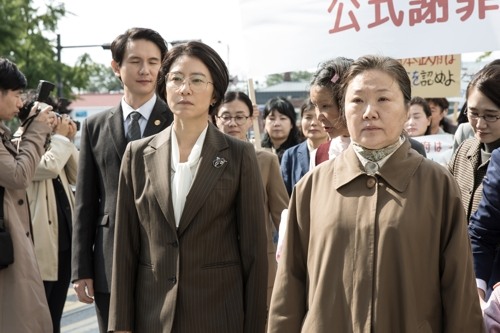'Herstory' revisits an overlooked chapter of Korean history
Recently, we have witnessed a host of "comfort women" stories in Korean cinema. "Spirits' Homecoming" (2016), "Snowy Road" (2017) and "I Can Speak" (2017) offered glimpses into the pains, scars and courage of women forced into sex slavery for Japan's imperial army, in a time when the long-standing historical disputes have reemerged to haunt diplomatic ties between the two countries.
The forthcoming "Herstory" looks into the tragedy from a different viewpoint, weaving the victims' desperate battle for honor and justice in the courtroom.
The movie tells a real-life story of 10 Busan-based former sex slaves who embarked on an uphill legal battle that lasted six years from 1992 in Shimonoseki, Japan, to demand a proper apology and compensation from the Japanese government.
The court trial is not well known to the Korean public even though it produced a rare and meaningful ruling that ordered the Japanese government to compensate the plaintiffs for the first time in the history of court trials related to "comfort women." The ruling, however, was later overturned by higher courts.
 |
| A still from "Herstory" (Yonhap) |
Audiences can only understand their tragic life stories through the elderly women's voices in the courtroom. It was not a bad choice, as it differentiates it from other films about the same subject and will have saved on production costs. The only problem here is that audiences need to listen carefully to the dialogue or they may miss part of what the women say because some speak in a highly emotional tone.
The movie, instead, tries to realistically and calmly show the sufferings of the women through the traces remaining in their lives from those years of nightmare. As the Japanese government tries to evade responsibility by citing a lack of evidence, some of the elderly women expose old scars on their bodies from being stabbed and mutilated with a knife by Japanese soldiers, saying, "I'm both the evidence and witness."
Kim Hae-sook, Ye Su-jeong, Moon Sook, Lee Yong-nyeo play four of the 10 elderly women who took part in the trial, while Kim Hee-ae takes the role of Moon Jeong-suk, head of a Busan-based tour agency who volunteers to lead the group of plaintiffs.
Moon establishes a hotline in her company office for sex slavery victims in the region upon a request from her colleagues in a regional association of female entrepreneurs wanting to do the right thing for the community.
She vows to do the service only for three months at first, but gradually becomes deeply involved in the case after learning that Bae Jeong-gil (played by Kim Hae-sook), who worked for her for about 16 years as a housemaid, was one of the victims.
To some extent, the film is a truehearted coming-of-age story of the four elderly women who gradually come to have the courage to speak out about what they had to endure and demand apology from the Japanese government with help from their supporters.
The movie, however, is not completely grim and serious. The performance by Kim Seon-yeong as a hot-tempered but warmhearted friend of Moon delivers unexpected humor. Bae's personal secret brings an unexpected twist, which is the story's biggest plus.
It was directed by Min Kyu-dong, who is best known for "All About My Wife" (2012) and "All For Love" (2005).
Presented by Next Entertainment World, "Herstory" opens in theaters on June 27. (Yonhap)




























